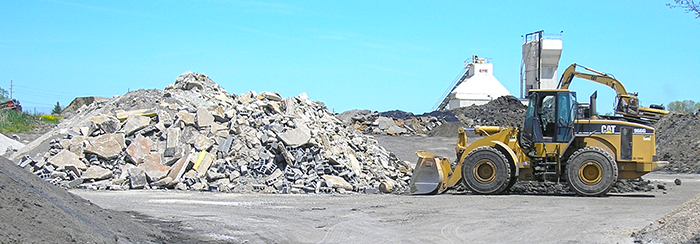When we visit concrete plants across the country, there's one constant we almost always see - concrete stockpiles. We see stockpiles of both big pieces of hardened material and loose, crumbling, unconsolidated materials. Here we discuss ways some concrete producers can cut waste, eliminate stockpiles, and reduce their need for dealing with "waste concrete"
We hear it all the time from folks in the concrete industry:
"I've got a big pile of waste concrete and nothing to do with it. What should I do with all my waste concrete?"
This is a vital question, since without a clear answer excess concrete materials always end up building up, causing the same old problems, and represent a possible compliance issue, lost opportunities, or even lost revenue. However, if you have a plan for excess concrete materials, you can turn these potential negatives into a real positive for your facility.
What to do with waste concrete?
Let's get two things cleared up right away:
- This information applies to any type of concrete operation, be it ready-mix, precast, block, pipe, etc.
- As an industry, we need to stop calling it waste. Waste has regulatory meanings, and sounds like garbage. Your excess material is not waste. More on that below.
So whether you're looking to cut down on waste as part of an effort to improve operations, comply with regulations, or to just clean up the site, many of our clients are often faced with the question of what should be done with this excess concrete material.

The 5 Best Ways to Handle Waste Concrete
- It's usually not waste, so stop calling it that! Change the mindset of your operation! If it's really waste, bite the bullet and haul it to a landfill (usually at huge costs)! If your material has any sort of value, and you realize it's a potential resource, instruct everyone to stop calling it waste. Maybe you can reuse or recycle the material. Start referring to it as 'concrete material', 'excess concrete material', 'concrete fines', or my favorite 'recyclable concrete'.
- Stop making so much excess concrete. This is the heart of the problem. I know much of the fault falls on customers over-ordering, but I’m always delighted to hear of producers having an “environmental fee” for returned concrete. You buy car batteries, tires, or get your oil changed, a lot of times mechanics build in environmental fees for handling and processing your unwanted stuff. Do the same! Discuss returned concrete with your sales staff or ramp up your quality control procedures so that you don’t generate unsuitable product. Whatever it takes – don’t make so much of it. I know it's easy to say and not always so easy to do, but it's a great place to look first.
- Reuse your excess concrete. Have you considered batching new concrete on leftover excess concrete? There’s a lot of good research and information out there that says it can be done from a technical basis, such as by using certain types of concrete admixtures, so talk to an expert and find out if you can do this. This is really your most environmentally sound practice for excess concrete materials, and also one of the more financially lucrative options.
- Recycle excess concrete materials. There are ample opportunities now to recycle. Plastic concrete can be put through a concrete reclaimer to make aggregate suitable for further concrete production. Hardened concrete can be crushed to make an excellent base material with a lot of great uses today. In both cases, you are recouping value for material that otherwise is a financial negative for you. If you have a mountain of old concrete at your site, consider the opportunities for recycling that material!
- Re-purpose excess concrete! Pave your yard, start making blocks, turn that already paid for product into something else you can sell! I’ve been to plenty of precast concrete plants that made a product unsuitable for its original use, yet they've found another purpose (or buyer) for it. One great local example is a concrete pipe plant I work at, which retains pipe unsuitable for high-spec work and is instead sold to local farmers and other land owners who are happy to use it under farm roads for drainage. I’ve seen this type of thing happen time and time again. Get creative and find other uses for your product.
Remember, you're in the concrete business. Making a product and getting it out the door is your number one goal. You're not a landfill, so don't stockpile material like you are!
Your best solution for excess concrete materials at any concrete plant starts with simply addressing the issue, and developing a plan. Without a plan, your pile of “concrete waste” will likely continue to grow. With a well thought-out plan, you’ll find operational, compliance, and financial benefits you likely aren’t receiving now. If you're struggling with excess concrete materials, click here to contact us or give us a call at 609-693-8301 to discuss your needs.


